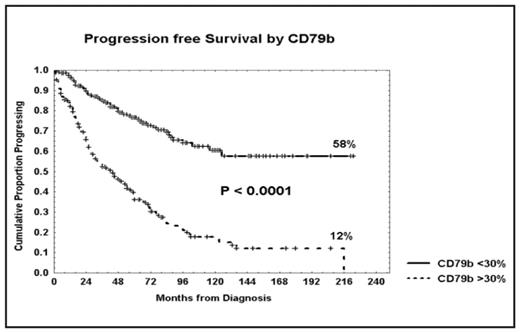Abstract
The immunoglobulin (Ig) beta protein (CD79b) dimerizes with Ig alpha (CD79a) to form the signaling component of the B-cell antigen receptor complex (BCR). Given the critical role of Ig beta in BCR signaling, it has been suggested that its variable expression in CLL may induce either cell proliferation or apoptosis. High CD79b expression has been associated with atypical morphology, strong expression of surface Ig, advanced clinical stage and short overall survival in B-CLL (Garcia Vela, 1999; Zucchetto, 2006). Moreover, high CD38 expression was correlated with high CD40, CD69 and CD79b which are consistent with an activation phenotype (Damle, 2002). Furthermore, we have demonstrated that the ZAP-70+ CLL subgroup shows a rapid disease progression and an inferior overall survival (Del Principe, 2006). Since it has been described that BCR engagement has significant effects on B-CLL cell survival, activation and cell cycle progression (Deglesne, 2006), we decided to evaluate the real impact of CD79b expression on B-CLL prognosis. The primary aims of our research were: 1) to determine progression-free survival (PFS) and overall survival (OS) upon CD79b expression; 2) whether CD79b could predict varied outcome within ZAP-70+ and ZAP-70 negative subgroups; and finally 3) whether CD79b was an independent prognostic factor. Therefore, we investigated 401 patients (pts), median age 65 years (range 33–89), 213 males and 188 females. With regard to modified Rai stages, 123 pts had a low stage, 261 an intermediate stage and 17 a high stage. CD79b was determined by multicolor flow cytometry, using the monoclonal antibody anti-CD79 beta-FITC (clone SN8, Dako) and fixing a cut-off value of 30%. CD79b+ B-CLL pts were 207/401 (52%). CD79b>30% was significantly associated with the intermediate/high Rai stage (p=0.00001), beta-2 microglobulin >2.2 mg/dl (p<0.0001) and with multiple intrathoracic/abdominal lymphadenopathies and/or splenomegaly (p<0.0001). Low CD79b was significantly correlated either with IgVH mutated status (>2%) (86/105; p<0.0001) or lower soluble CD23 levels (125/161; p<0.00001). Significant associations were found either between CD38<30% and lower CD79b (172/194; p<0.0001) or ZAP- 70<20% and CD79b<30% (145/193; p<0.0001). With regard to cytogenetics, there were strict correlations either between high CD79b and trisomy 12 (25/33; p=0.001) or high CD79b and del17p (16/20; p=0.001). Median follow up duration from diagnosis was 68 months (range 6–230). Concerning clinical outcome, both a shorter PFS (Figure) and OS were observed in CD79b+ pts (12% vs 58% at 16 years; p<0.0001 and 49% vs 85% at 16 years; p<0.0001) as well as in ZAP-70+ pts (5% vs 52% at 11 years; p<0.0001 and 33% vs 87% at 18 years; p<0.0001). To further explore the prognostic value of CD79b, we investigated its expression within ZAP-70+ (159 pts) and ZAP-70 negative (242 pts) subsets. As a matter of fact, CD79b+ pts showed a shorter PFS and OS both within the ZAP-70+ subset (7% vs 19% at 10 years; p=0.00006 and 25% vs 65% at 16 years; p=0.006) and within the ZAP-70 negative subset (29% vs 67% at 14 years, p<0.00001 and 86% vs 100% at 14 years; p=0.01). In multivariate analysis of PFS and OS, in which age, Rai stages, CD38, CD69, CD79b and ZAP-70 entered, ZAP-70 (p=0.001 and p=0.001), CD69 (p=0.001 and p=0.01) and CD79b (p=0.0007 and p=0.03) resulted to be independent prognostic factors. Therefore CD79b, easily determined by flow cytometry, should be considered another important prognostic parameter and could be used to early identify and stratify B-CLL progressive pts.
Disclosures: No relevant conflicts of interest to declare.
Author notes
Corresponding author


This feature is available to Subscribers Only
Sign In or Create an Account Close Modal